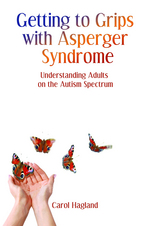 Carol Hagland is the author of Getting to Grips with Asperger Syndrome and co-author of Working with Adults with Asperger Syndrome, both published by Jessica Kingsley Publishers. She worked as a chartered clinical psychologist in the NHS for over thirty years, the last ten years being in the field of learning disabilities.
Carol Hagland is the author of Getting to Grips with Asperger Syndrome and co-author of Working with Adults with Asperger Syndrome, both published by Jessica Kingsley Publishers. She worked as a chartered clinical psychologist in the NHS for over thirty years, the last ten years being in the field of learning disabilities.
What first interested you in Asperger Syndrome?
I first became interested in Asperger’s syndrome over twenty-five years ago, after meeting someone in an adult mental health setting, who had received this diagnosis. I was intrigued by his oddness and the fact that he did not seem to be mentally ill in the accepted sense. Nevertheless, he clearly had a number of problems in coping with life, and I began to read everything I could about the condition, and what was known about it at the time.
Your new books are specifically about adults with Asperger’s syndrome. Why have you chosen this focus?
Although life for children with AS is still not easy, the condition is now much more readily recognised and diagnosed. Treatment approaches and support are more readily available than they were. In contrast, many adults have never received a diagnosis, or have not been diagnosed until well into their adult life. These folks have often struggled for years, not knowing why they were different, and not being able to make sense of themselves or their difficulties. Families have often become frustrated and despairing, as have care staff in residential settings where the person ends up in such a situation.
Adults with AS seem so often to be regarded as a frustrating puzzle. I have spent much of the last ten years or so teaching and training people to understand and manage the problems that AS can present, and it seemed that this was an area where lots of people, regardless of their level of training, would welcome some help. My co-author, Zillah Webb, came from a setting where she had worked extensively with adults with autism, as well as those with Aspergers, and we both felt that a book that focussed on the particular problems of adults with AS was needed.
What sort of differences are there between experiences of adults and children with Asperger’s syndrome?
When children are diagnosed with AS relatively early in life, there are then opportunities to set up systems around them which make it easier for them to cope with the demands of society, and to understand why they react as they do. Both they and their families or carers are more likely to be able to capitalise on their strengths and compensate for their weaknesses. While the situation for many children with AS is far from perfect, it is still far better than for many adults, who may have gone through life meeting problem after problem, being bullied, losing friends, partners and jobs, and even getting into serious trouble with the law, without fully understanding what they have done wrong. While they often have a sense of being different, they have no model for making sense of themselves and how they respond to the world around them, and this adds to their difficulties, frequently resulting in mental health problems on top of their other challenges. These adults with AS tend to come to mental health services when they are in crisis, and this may also be the point at which they finally receive a diagnosis.
Who or what most inspires you?
I think what inspires me most is a puzzle that I can’t make sense of, especially if it is people-related. I like to understand what makes people tick. I guess that is why I became a psychologist!
What do you enjoy doing in your spare time?
Gardening and dancing.